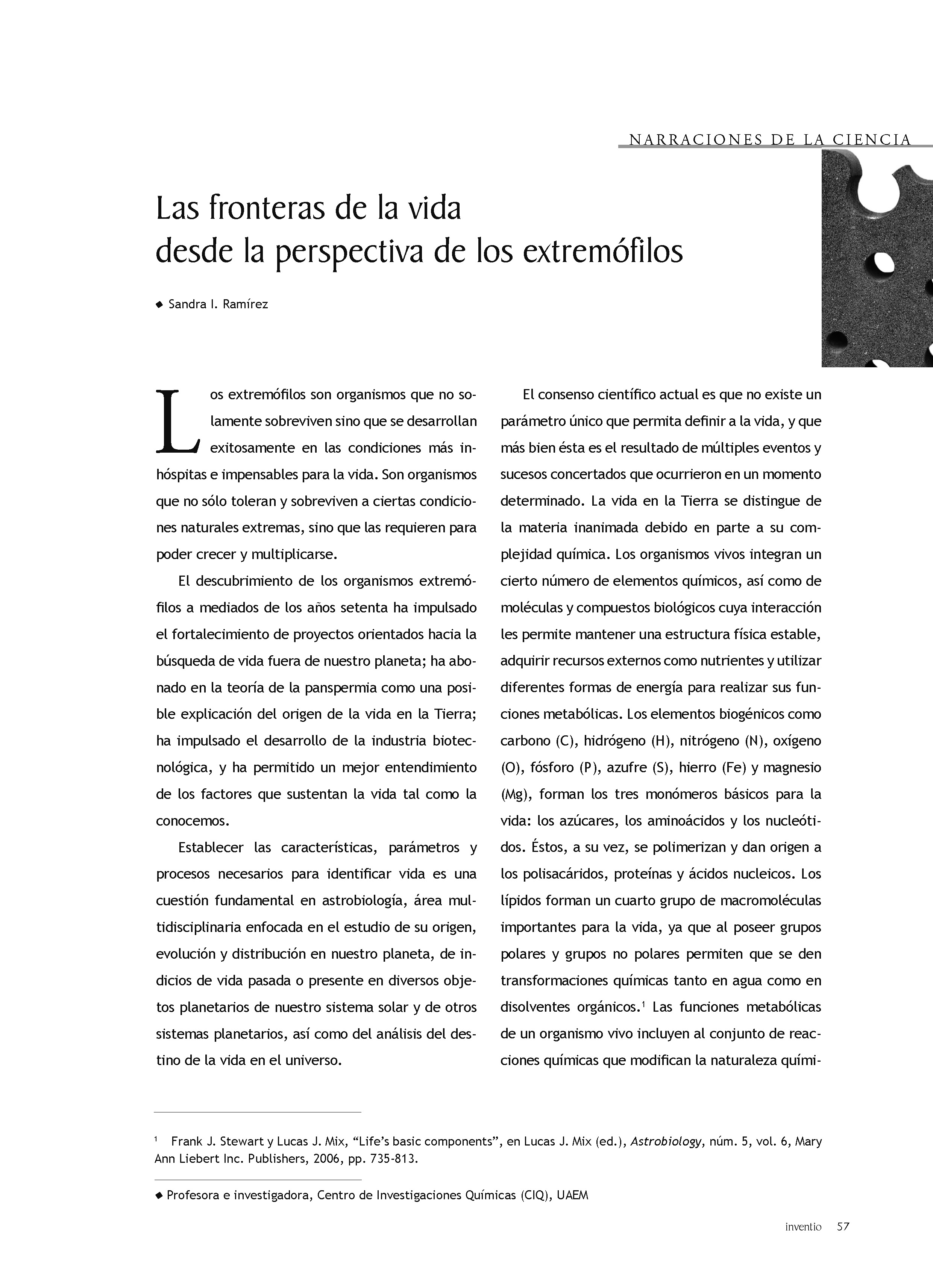Las fronteras de la vida desde la perspectiva de los extremófilos
Resumen
La autora estudia aquí las formas de vida que sobreviven en ambientes extremos de la tierra. En primer lugar define lo que se entiende por vida y los parámetros con los cuales se define. El descubrimiento de microorganismos extremófilos abrió nuevos panoramas a la biología molecular y en especial a la astrobiología, pues se ha replanteado la idea de vida fuera del planeta y la busqueda de vida en meteoritos. Además, describe las características de los organismos extremófilos, su clasificación y los mecanismos de estos organismos para poder sobrevivir en ambientes hostiles. En los años que vienen se esperan resultados interesantes gracias a las técnicas de exploración en lugares recónditos y a las metodologías analíticas necesarias para la identificación de biomarcadores.
Referencias
Frank J. Stewart y Lucas J. Mix, “Life’s basic components”, en Lucas J. Mix (ed.), Astrobiology, núm. 5, vol. 6, Mary Ann Liebert Inc. Publishers, 2006, pp. 735-813.
Gerald F. Joyce, “Foreword”, en David W. Dreamer y Gail R. Fleischaker (eds), Origins of Life: The Central Concepts, Jones and Bartlett, Boston, 1994, pp. XI-XII; Pier Luigi Luisi, “About variations and definitions of life”, en Origins of Life & Evolution Biospheres, núms. 4-6, vol. 28, 1998, pp. 613-622.
Carol E. Cleland y Christopher F. Chyba, “Defining ‘life’”, en Origins of Life and Evolution Biospheres, núm. 4, vol. 32, 2002, pp. 387-393.
Carl R. Woese, Otto Kandler y Mark L. Wheelis, “Towards a natural system of organisms: proposal for the domains Archaeam Bacteria, and Eucarya”, en Proceedings of the National Academy of Science of the United States of America, núm. 12, vol. 87, 1990, pp. 4576-4579.
Orion J. Johnson, “Biodiversity”, en Lucas J. Mix (ed.), Astrobiology, op. cit., p. 735; Edward O. Wilson y Frances M. Peter, Biodiversity, National Academic Press, Washington DC, 1988; Edward O. Wilson, “The encyclopedia of life”, en Trends in Ecology & Evolution, núm. 2, vol. 18, 2003, pp. 77-80.
Thomas P. Curtis, William T. Sloan y Jack W. Scannell, “Estimating prokaryotic diversity and its limits”, en Procee¬dings of the National Academy of Science of the United States of America, núm. 16, vol. 99, 2002, pp. 10494-10499
Norman R. Pace, “A molecular view of microbial diversity and the biosphere”, en Science, núm. 5313, vol. 276, 1997, pp. 734-740; Edward O. Wilson, “On global biodiversity estimates”, en Paleobiology, núm. 1, vol. 29, 2003, p. 14.
Ricardo Cavicchioli, “Extremophiles and the search for extraterrestrial life”, en Astrobiology, núm. 3, vol. 2, 2002, pp. 281-292; Lynn J. Rothschild y Rocco L. Mancinelli, “Life in extreme environments”, en Nature, núm. 6823, vol. 409, 2001, pp. 1092-1101.
Giles M. Marion, Christian H. Fritsen, Hajo Eiken y Meredith C. Payne, “The search for life on Europa: limiting environmental factors, potential habitats, and Earth analogues”, en Astrobiology, núm. 4, vol. 3, 2003, p. 785-811.
Corien Bakermans, Alexandre I. Tsapin, Virginia Souza-Egipsy, David A. Gilichinsky y Kenneth H. Nealson, “Reproduc¬tion and metabolism at -10°C of bacteria isolated from Siberian permafrost”, en Environmental Microbiology, núm. 4, vol. 5, 2003, pp. 321-326.
Giles M. Marion, Christian H. Fritsen, Hajo Eiken y Meredith C. Payne, “The search for life on Europa: limiting environmental factors, potential habitats, and Earth analogues”, en Astrobiology, núm. 4, vol. 3, 2003, p. 785-811
Jeffrey S. Kargel, Jonathan Z. Kaye, James W. Head, Giles M. Marion, Roger Sassen, James K. Crowley, Olga Prieto Ballesteros, Steven A. Grant y David L. Hogenboom, “Europa’s crust and ocean: origin, composition, and the prospects for life”, en Icarus, núm. 1, vol. 148, 2000, pp. 226-265.
David S. McKay, Everett K. Gibson Jr., Kathie L. Thomas-Keprta, Hojatollah Vali, Christopher S. Romanek, Simon J. Clemett, Xavier D. F. Chillier, Claude R. Maechling y Richard N. Zare, “Search for past life on Mars: possible relic biogenic activity in Martian meteorite ALH84001”, en Science, vol. 273, 1996, pp. 924-930.
Paul Davis, “Survivors from Mars”, en New Scientist, vol. 159, 1998, pp. 24-29; Svante Arrhenius, Worlds in the Making, Harper & Brothers, New York, 1908.
Benjamin P. Weiss, Joseph L. Kirschvink, Franz J. Baudenbacher, Hojatollah Vali, Nick T. Peters, Francis A. Macdonald y John P. Wikswo, “A low temperature transfer of ALH84001 from Mars to Earth”, en Science, núm. 5492, vol. 290, 2000, pp. 791-795.
Raúl J. Cano y Mónica Borucki, “Revival and identification of bacterial spores in 25 to 40 million year old Dominican amber”, en Science, núm. 5213, vol. 268, 1995, pp. 1060-1064.
Stefan Leuko, Andrea Legat, Sergiu Fendrihan, Heidi Wieland, Christian Radax, Claudia Gruber, Marion Pfaffenhuemer, Gerhard Weidler y Helga Stan-Lotter, “Very similar strains of Halococcus salifodinae are found in geographically separated Permo-Triassic salt deposits”, en Microbiology, núm. 12, vol. 145, 1999, pp. 3565-3574.
Karl O. Stetter, “Hyperthermophilic prokaryotes”, en FEMS Microbiology Reviews, núms. 2-3, vol. 18, 1996, pp. 149-158.
Matthew Levy, Stanley L. Miller, Karen Brinton y Jeffrey L. Bada, “Prebiotic synthesis of adenine and amino acids under Europa-like conditions”, en Icarus, núm. 2, vol. 145, 2000, pp. 609-613
Matthew Levy and Stanley L. Miller, “The stability of the RNA bases- implications for the origin of life”, en Proceedings of the National Academy of Science of the United States of America, núm. 14, vol. 95, 1998, pp. 7933-7938.
Philippa J. R. Uwins, Richard I. Webb y Anthony P. Taylor, “Novel nano-organisms from Australian sandstones”, en American Mineralogist, núms. 11-12, vol. 83, 1998, pp. 1541-1550.
E. Olavi Kajander y Neva Çiftçioglu, “Nanobacteria-an alternative mechanism for pathogenic intra- and extracellualr calcification and stone formation”, en Proceedings of the National Academy of Science of the United States of America,núm. 14, vol. 95, 1998, pp. 8274-8279.

Descargas
Publicado
Número
Sección
Licencia

Esta obra está bajo una licencia internacional Creative Commons Atribución-NoComercial 4.0.
Esta revista proporciona acceso abierto inmediato a su contenido, con base en el principio de ofrecer al público un acceso libre a las investigaciones para contribuir a un mayor intercambio global de conocimientos. Se distribuye bajo una licencia Creative Commons Reconocimiento-NoComercial 4.0 Internacional License.

